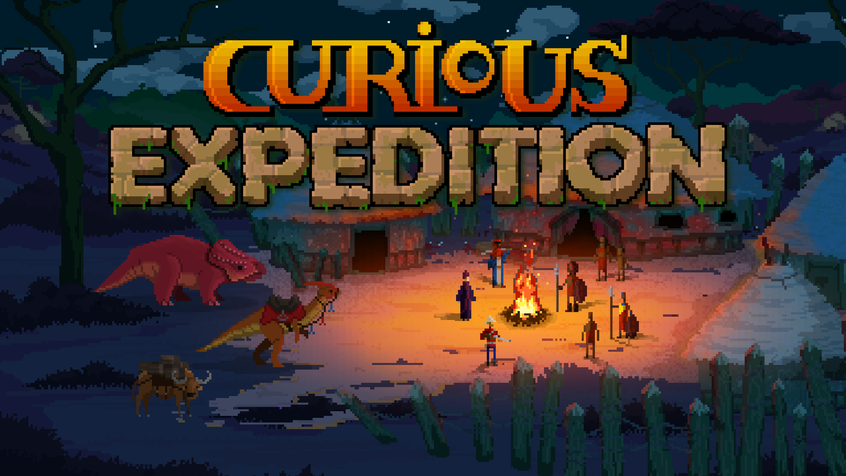Curious Expedition
Any time I grab a Victorian exploration game, I feel a bit of trepidation. The world of European exploration is so fraught with disaster and racism that it feels almost impossible to safely navigate. It is possible, don’t get me wrong. 80 Days is one of my absolute favourite games, and it does a fantastic job striking a balance between depicting and critiquing colonialism. Even Archeo: Shinar , a game I have mixed feelings about mechanically, does a decent job depicting the fundamental horrors of colonialism and the true cost of European exploitation of indigenous peoples. There is, however, always that lingering doubt in my mind about what happens when I inevitably come across a game that does not critically examine exploration, and instead, leans into the tropes of the noble white man, out to understand and tame a hostile world. I look at every exploration game in my library, wondering if this will be that game.
Folks, I’d like to introduce you to Curious Expedition.
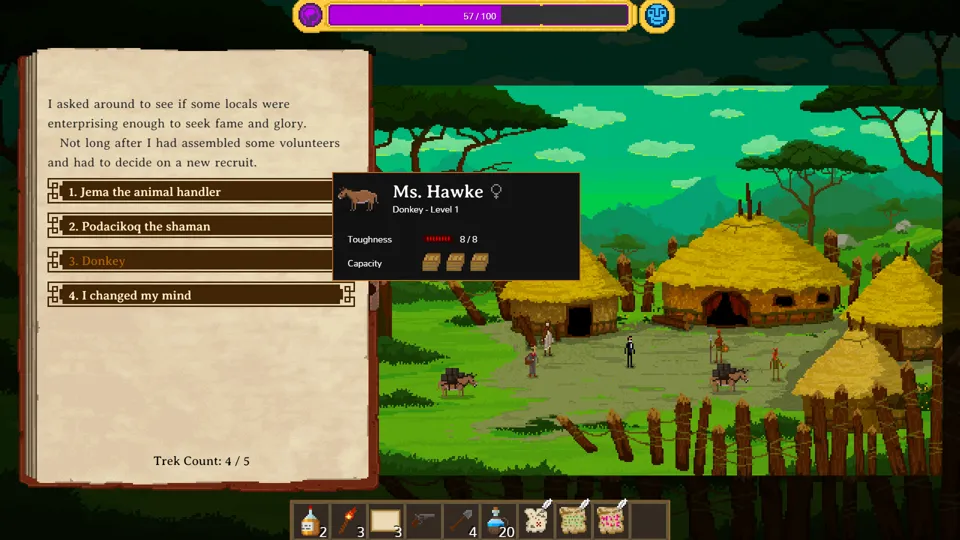 I am prepared to not only turn this into a drinking game, but be sozzled before I finish the first trek.
I am prepared to not only turn this into a drinking game, but be sozzled before I finish the first trek.
In any approach to a historical game, there has to be some degree of awareness of the history being depicted, and of its impact, both positive and negative, on all parties. While European exploration and European colonialism are not necessarily the same thing, they are two sides of the same coin, spawning one another, and stemming from the same root belief in the inferiority of the non-European world. It’s a mindset that, ideally, much of the world has moved past, or is at least aware that we ought to have moved past. The idea of the noble savage or the white man’s burden are ideas of the past, and ones that need to be punted hard back into the fucked-up history from which they spawned.
When creating an exploration game set in this time period, then, game devs ought to face a dilemma of how to depict these racist and colonialist beliefs. Ideally, the devs provide a critique or some sort of affirmation that they recognise how inappropriate and outmoded these ideas are. This is what 80 Days and Renowned Explorers does. What doesn’t work is for a game to blithely ignore these questions, and continue that colonialist narrative uncommented upon, and as if it doesn’t exist.
This is the decision Curious Expedition makes, and while there are many, many elements of this game that I find baffling, it’s this one decision to play the colonialist narratives straight that I struggle with the most.
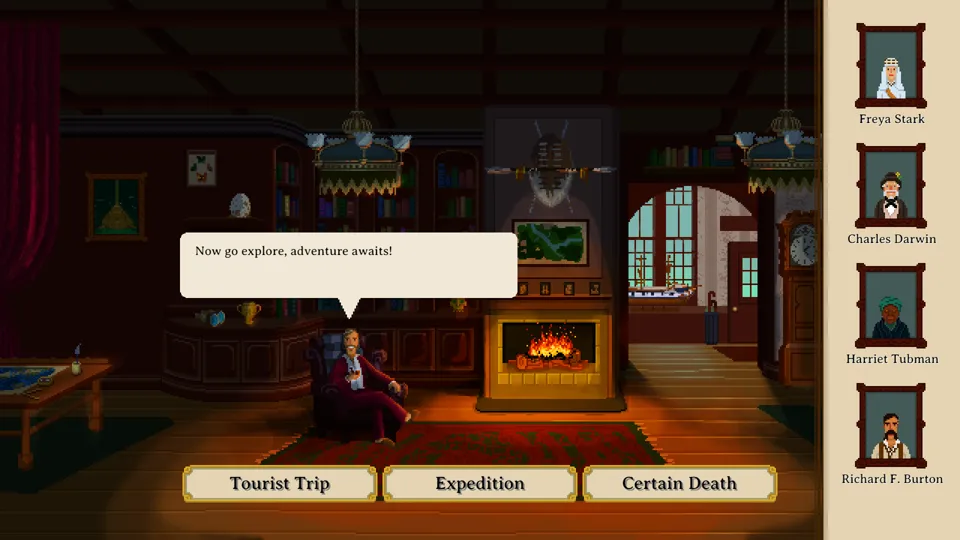 Ah yes, that most famous of explorers, Harriet Tubman. How could I forget her Arctic expeditions.
Ah yes, that most famous of explorers, Harriet Tubman. How could I forget her Arctic expeditions.
Curious Expedition’s colonialist narrative is told through the lens of a series of expeditions into parts unknown. The player plays as an explorer (my personal favourite option is Rasputin), and travels to far-off lands in search of treasure, stories, and adventure. This treasure is then brought back to London where it is either donated to a museum to much fame and acclaim, or sold to fund the next expedition. While these expeditions are discrete stories, each builds on the next through the party members obtained, the funds gained, and the general lessons learned.
In each expedition, the player travels along a map, searching for a golden pyramid, and having encounters along the way. These might be combats with wild animals, tomb robberies, or encounters with local villages. Understanding how to optimise and win these expeditions is arcane, bordering on impossible, but they’re not the fundamental problem with this game.
The fundamental problem is that it plays the colonialist story of exploration completely straight. The villagers in the villages are overjoyed to see an explorer, showering them in gifts and sharing their resources with them. When the explorer asks them to come with them, they do, and when the explorer steals their sacred shrine to take back to London, they alternate between being sad, and turning into the same type of sprite as a wild animal on the world map as they hunt down the explorer. They are dehumanised, seen solely in the light of what they mean to the explorer and their expedition. There is no greater narrative for the indigenous peoples. They are as objectified as animals, as treasure, as anything else the explorer might encounter. When the explorer draws their ire, they can be dodged or killed without real consequence. They have the agency of a volcano, and indeed, are less threatening than one.
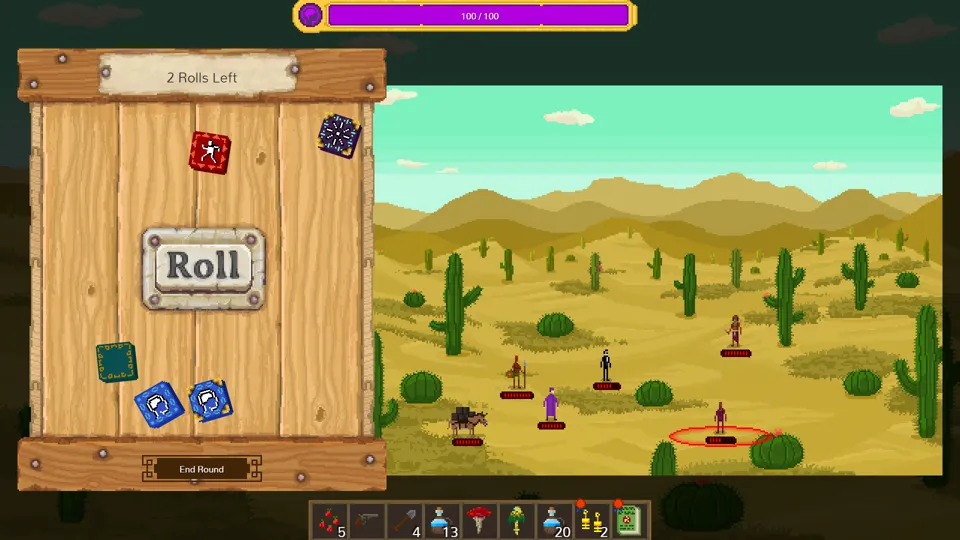 This is the combat system, and I hate it.
This is the combat system, and I hate it.
Of course, the argument could be made that this dehumanisation is the point. It could be argued that the point of the game is to depict exploration from the point of the explorers, and that these explorers saw those they encountered as less than human. In that context, channeling a colonialist mindset isn’t an unintentional misstep on the part of the devs, but rather, an intentional choice to depict the horrors of colonialism and the consequences of its dehumanisation.
If that is the counter-argument, it’s a poor one. There’s a reason genocide isn’t generally depicted as a fun activity for the genocidaires to undertake. There’s a reason The Killing Fields is called “the Killing Fields” and not “Pol Pot’s Magical Revolutionary Day.” In those instances where genocide is depicted from the perspective of its perpetrators, it’s done so with the knowledge that we are observing something horrific, and with the creators’ knowledge that they are engaging in something horrific. This is the power of the film Zone of Interest, for example. There, genocide is portrayed from the perspective of its perpetrators, and the banality of it leads to absolute and chilling horror.
None of this is what Curious Expedition chooses to do. From the outset, it tells the player to have a fun adventure, and sends them out with every expectation that that is what they will do. It acts with the clarity of conscience of a Belgian king assessing the profitability of his rubber plantations. It presents the exploitation of indigenous peoples as a decision with minimal consequences, and even those consequences can be easily avoided or killed.
It takes the perspective of the genocidaire and expects you, the player, to have fun with it.
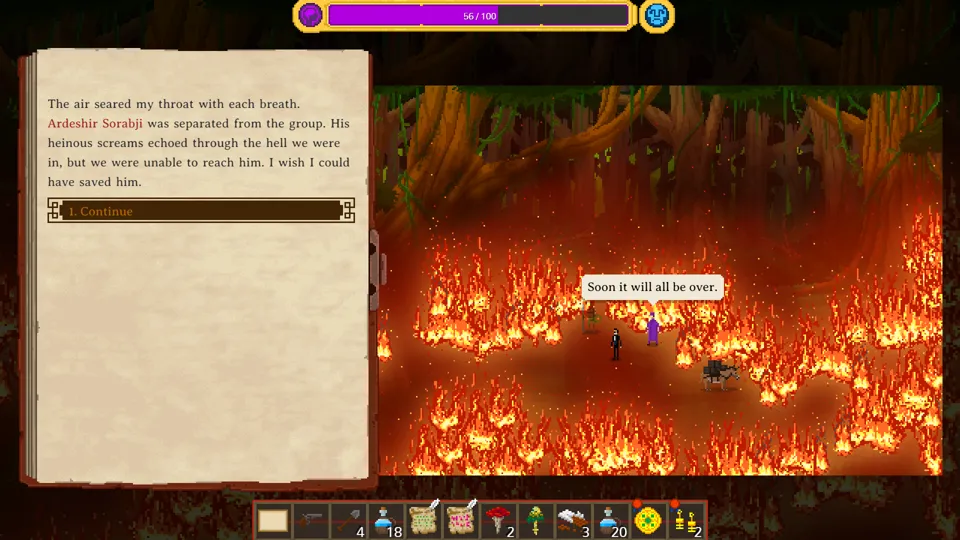 It’s me. I am the screams.
It’s me. I am the screams.
The worst part, for me, is that I don’t think the devs intended or are even necessarily aware that the game does this. The game is presented throughout with the earnest sincerity of a team who wanted to make a fun exploration game. There are elements of exploration and expeditions that are fun and lend themselves well to games, don’t get me wrong. I’ve listed multiple games in this review that get these ideas right, and do a good job with their source material and subject matter, and craft something fun and unproblematic. What bothers me most about Curious Expedition is that it feels like it never occurred to the writers to question what they were writing or what their game was depicting. Instead, colonialist narratives were shared wholesale and unquestioned, parroting ideas that should have stayed long dead. There isn’t that consideration for the history or consequences of what they’re depicting. Setting aside the horror of this depiction, the game itself is a shallow exploration of exploration at best, specifically because it doesn’t care about those historical consequences. It asks the player to exist within an opaque bubble, oblivious to the blatant reality, but pretending there is nothing to be oblivious about.
Curious Expedition is a depiction of atrocity that asks us to unironically enjoy said atrocity. You’ll forgive me if I refuse.
Developer: Maschinen-Mensch
Genre: Roguelike, Simulation
Year: 2016
Country: Germany
Language: English
Play Time: 12 Hours
Youtube: https://youtu.be/GMdD_zdLXNw
